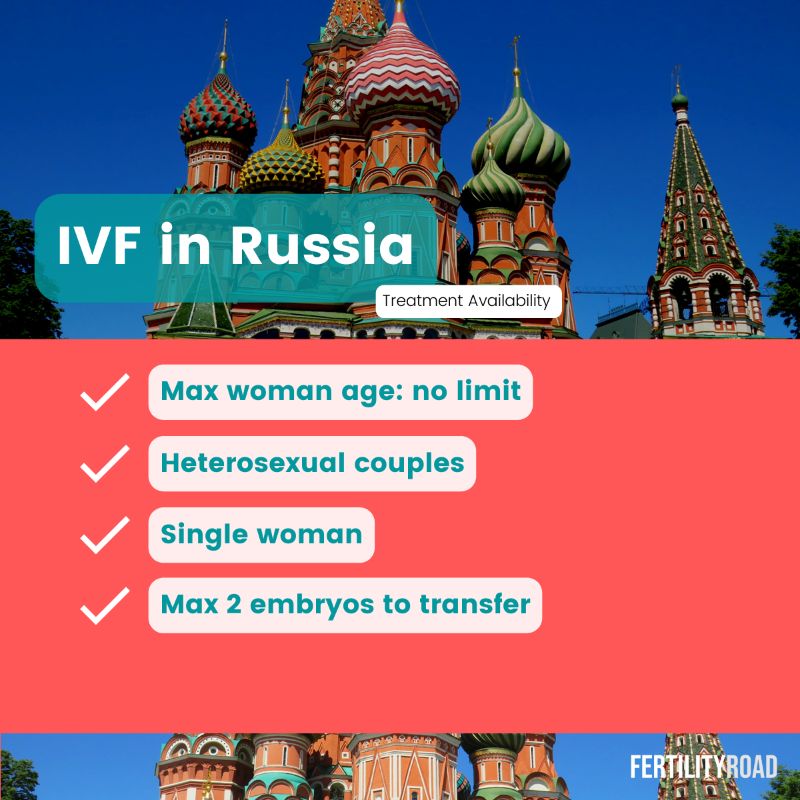
We analyse your needs, treatment type, destination preferences and find top IVF Clinics for you.

Russia is a popular and affordable destination for receiving IVF treatment. Patients visit Russia from all over the world, and the most popular cities to receive treatment are St. Petersburg and Moscow.
There are many experienced clinics in Russia as well as highly experienced doctors, and there is a large donor pool for egg donation as well as no waiting lists.
There are about 200 IVF clinics in Russia, but only about 10 of these treat international patients. Most of the clinics are located in Moscow and St. Petersburg. Patients considering IVF treatment abroad, especially IVF with donor eggs often chose Russia or Ukraine because of the IVF treatment costs.
If you want to save costs on your treatment, Russia is an excellent destination. One thing to be aware of, however, is that it is not a member of the European Union. That means you will need to get a visa for your visit. As soon as you are in the country, you will find that the level of service and the quality of treatment are excellent in the clinics that specialise in treating international patients.
Find Top IVF Clinics in Russia >
There are various legal considerations to consider when you travel to Russia for IVF treatment, so it’s important to know these before you start planning your trip.
While there is no maximum age limit set by law for female patients, the rules are decided by individual clinics. It’s therefore important to ask your chosen clinic what their rules are. There is no maximum age limit for the male partner.
Heterosexual couples and single women can receive IVF treatment in Russia. However, female couples and male couples are unable to receive treatment.
As with many other destinations, gender selection is not permitted for family balancing reasons. However, it may be allowed to prevent the transmission of genetic diseases. Also be aware that in the genetic embryo test results, some clinics may reveal the embryo’s sex.
HIV-positive patients are not legally prevented from receiving IVF treatment, but it will depend on the clinic. This is the same for HCV-positive and HBV-positive patients.
When transferring embryos with your own eggs or donor eggs, the maximum number is two.

Find Top IVF Clinics in Russia >
There are many egg donors available in Russia. These mainly consist of Caucasian donors, but some clinics provide donors from other ethnicities, including Scandinavian and Asian donors. Many Asian patients choose Russia for IVF treatment using egg donation for this reason.
One of the things to consider in Russia is that while egg donors are anonymous, the clinics may reveal more information about the donors compared to other countries. This includes their skills, education, history, general description, weight, nationality and even baby pictures of the donor. But recipient couples and babies cannot know the identity of the donor, and there is no mixed system of anonymous and non-anonymous donors.
Egg donation is popular because there are no waiting lists, and both fresh and frozen oocytes are available. The age of donors is legally restricted to between 18 and 35 years old.
When a donor is matched to a recipient, this is based on visual characteristics like race, hair colour, eye colour and skin colour to ensure the donor is as similar as possible to the recipient.
There are also several donor qualification tests that are required by law including:
Find Egg Donation Clinics in Russia >
There are many sperm donors available in Russia of various ethnicities, but they are mainly Caucasian. There are no waiting lists, and most IVF clinics in the country have their own sperm banks. If patients cannot find a matching donor race, they may be able to find one in external sperm banks.
The age limit for sperm donors in Russia is between 18 and 35. Donor identities are strictly anonymous, and the couple are unable to find out the identity of the donor in any conditions. Only basic physical characteristics can be used to make sure the match is as close as possible.
Russia is another, very affordable country to receive IVF treatment in Europe besides Ukraine.
| IVF costs in Russia – basic packages | |
| IVF with own eggs in Russia | €2,300 – €2,900 |
| IVF with donor eggs in Russia | €4,000 – €4,800 |
| Embryo donation in Russia | €2,000 – €2,800 |
| Egg freezing (oocytes cryopreservation) in Russia | €2,100 – €2,500 |
Find Top IVF Clinics in Russia >
When it comes to IVF using egg donation the average cost range of an egg donation cycle in Russia is between €4,000 and €4,800. This means Russia is one of the most affordable destinations in Europe.
However, it’s important to remember that the final cost will depend on several factors, including the number of oocytes from a donor that are used for fertilisation, additional techniques that are included, and whether the treatment is guaranteed. The cost will also vary depending on the clinic and the location in Russia.
There are also some clinics that offer “Refund Guarantee IVF” options and packages. In this case, the refund is based on the expected outcome of the programme. Keep in mind that these programmes tend to be more expensive.
The cost of embryo donation in Russia ranges from €2,000 to €2,800. This makes Russia a very affordable destination for embryo donation. Availability is also very good, and the embryos are primarily of Caucasian ethnicity.
The embryo donors are strictly anonymous and neither the couple nor the child can find out the identity in any condition. There is also no mixed system with anonymous and non-anonymous donations.
Double donation is available in Russia. This is where both oocytes from donors and sperm from donors are used. The cost of double donation is similar to the cost of egg donation programmes, but you have to consider the additional cost of the sperm donor, which is between €190 and €350 on average.
There are several other IVF costs involved for anyone seeking treatment in Russia. These include various IVF add-ons and additional services.
Medical consultations cost between €80 and €150 on average, and this makes them very affordable compared to many other countries. The doctors are also very experienced.
The cost of the frozen embryo transfer (FET) is between €1,000 and €1,300. This makes it less expensive than the European average.
Other costs in Russia include:
| IVF costs in Russia – other costs and add-ons | |
| Medical consultation (doctor) | €80- €150 |
| Sperm freezing | €190 – €350 |
| Donor sperm | €190 – €350 |
| Embryo Monitoring (Embryoscope, Time Lapse, Geri etc.) | €250 – €350 |
| Blastocyst culture | €150 – €250 included in basic packages in most of the clinics |
| PGT-A / PGS genetic embryo testing* | €1,400 – €1,600 |
| Vitrification of (remaining) embryos and storage for 1 year | €300 – €400 |
| FET – Frozen Embryo Transfer | €1,000 – €1,200 |
Find Top IVF Clinics in Russia >
The success rate in Russia for IVF treatment using your own eggs is good. According to the ESHRE EIM report for 2017:
You can see how this compares to other popular destinations in the table below.
| Success Rates for IVF with own eggs in popular countries in Europe* | Women under 34 | Women aged 35-39 | Women aged 40+ |
| Spain | 25.8 | 23.2 | 11.7 |
| Portugal | 26.6 | 21.2 | 14.3 |
| Czech Republic | 29.7 | 21.6 | 8.9 |
| North Cyprus** | no data | no data | no data |
| Greece | 30.4 | 22.8 | 9.7 |
| Ukraine | 25.4 | 22.7 | 14.1 |
| Poland | 30.5 | 25.9 | 12.9 |
| Russia | 30.3 | 24.1 | 12 |
| Latvia | 29.4 | 33.6 | 20.7 |
| Denmark | 30.4 | 20.2 | 12.3 |
Remember that comparing success rates across countries can be difficult because the results vary based on factors like patient characteristics and the treatments used. In general, most clinics achieve similar results.
Using data from the ESHRE EIM report for 2017, we can see the success rates for IVF treatment in Russia with donor eggs.
Egg donation success rates in Russia vs. other countries in Europe
| Egg Donation Success Rates in Popular Countries in Europe* | Pregnancies per fresh ET (%) | Pregnancies per thawed ET (%) |
| Spain | 54.7 | 51.1 |
| Portugal | 52.6 | 40.6 |
| Czech Republic | 42.2 | 23.1 |
| North Cyprus** | no data | no data |
| Greece | 54.7 | 50.1 |
| Ukraine | 61.6 | 62.2 |
| Poland | 34.4 | 44.7 |
| Russia | 48.0 | 45.0 |
| Latvia | 39.5 | 42.3 |
| Denmark | 38.6 | 33.7 |
Find Top IVF Clinics in Russia >
Data from Russian IVF clinics is reported to the Russian Association for Human Reproduction (RARCH), which publishes annual IVF success rates in the country. You can see the results here.
In addition, RARCH publishes all the certified IVF centres in Russia here. However, be aware that this website is only available in Russian.
If you are thinking about receiving IVF treatment in Russia, make sure you read our guide to travelling to and around the country first. Russia is a popular destination for IVF treatment, but it is slightly more complicated to travel here compared to other popular European destinations. Here’s what you need to know.
It’s a good idea to find out from your doctor about any vaccinations you may need before visiting Russia, like hepatitis A and B. Depending on where you go, you may even need typhoid or rabies vaccinations. Ask the IVF clinic you plan to use for advice. Also, make sure you have good travel insurance, and you may need to show proof of this when you arrive.
Russia is not considered a particularly dangerous country, especially in the major cities of Moscow and St Petersburg. However, petty crime may be a problem, so just be on your guard.
Russia has many international airports, and you can simply fly to the airport nearest to your IVF clinic. You can also fly internally during your time in the country.
Sheremetyevo International Airport is the most important travel hub, and it is located just outside Moscow. It has good connections with airports all over Europe and beyond. A flight here takes about four hours from London and nine hours from New York, and costs about $1,500 and $5,000 respectively.
Most travellers will need a visa to visit Russia, and you can get this from VFS Global. It should only take a few days, but it can take longer, so you should apply for a visa well in advance of your trip.
Tourist visas usually last for one month. You will need a valid passport, and it’s a good idea to have at least six months of validity on it. Carry your ID all the time in Russia along with the Immigrant Card you are given on arrival. You should also be able to demonstrate your return or onward travel documents.
As such a large country, you may find it easiest to travel by plane if you want to visit different areas. Russia has a very extensive air network, making this a convenient option.
Alternatively, you can travel by train. Russia has a huge train network, and you can travel almost anywhere. The journey from Moscow to St Petersburg takes about eight hours. Buy a ticket at the station or online.
Travelling by road is also an option, and there are large motorways linking major cities. However, be aware that the roads can often be crowded.
There is a lot to see in Russia if you plan to make a holiday out of your trip. Some of the top sights include Red Square, The Kremlin, St Basil’s Cathedral and Bolshoi Theatre in Moscow.
Other popular attractions include Mount Elbrus, the Valley of Geysers, St Sophia Cathedral in Novgorod, stunning Lake Baikal or taking a ride on the Trans-Siberian railway.
Visiting Russia is not as straightforward as other destinations for IVF treatment due to the stricter visa requirements, but that should not deter you. It is a beautiful and fascinating country with excellent IVF services and plenty to see during your time there, making it a great choice for anyone seeking IVF treatment.

| Cookie | Duration | Description |
|---|---|---|
| cookielawinfo-checbox-analytics | 11 months | This cookie is set by GDPR Cookie Consent plugin. The cookie is used to store the user consent for the cookies in the category "Analytics". |
| cookielawinfo-checbox-functional | 11 months | The cookie is set by GDPR cookie consent to record the user consent for the cookies in the category "Functional". |
| cookielawinfo-checbox-others | 11 months | This cookie is set by GDPR Cookie Consent plugin. The cookie is used to store the user consent for the cookies in the category "Other. |
| cookielawinfo-checkbox-necessary | 11 months | This cookie is set by GDPR Cookie Consent plugin. The cookies is used to store the user consent for the cookies in the category "Necessary". |
| cookielawinfo-checkbox-performance | 11 months | This cookie is set by GDPR Cookie Consent plugin. The cookie is used to store the user consent for the cookies in the category "Performance". |
| viewed_cookie_policy | 11 months | The cookie is set by the GDPR Cookie Consent plugin and is used to store whether or not user has consented to the use of cookies. It does not store any personal data. |